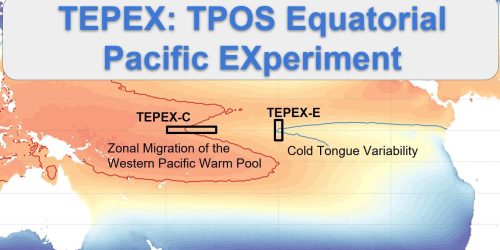Interactions between the air and sea have an important impact on Earth’s climate, and the scales of these interactions across space and time determine the specific effects. A recent study, partially funded by the Climate Program Office’s Climate Variability & Predictability (CVP) Program, examines the relative influence of weather and ocean currents in sea surface temperature changes and exchanges of heat between air and sea. CVP-supported scientist Ping Chang was among the international group of researchers who used two climate models to represent large (hundreds of km) and medium sized (tens of km) climate patterns. The results, published in JGR Oceans, show that changes on a scale larger than 2,000 km are driven by weather, but on longer time scales ranging from 2 months to several decades, ocean currents have more influence on climate patterns. CVP funded this project to increase our ability to predict air-sea interactions with an impact on the climate system over decadal time scales to better understand our rapidly changing climate.
Using Climate Models to Dig Deeper into Air and Sea Influences on the Global System











